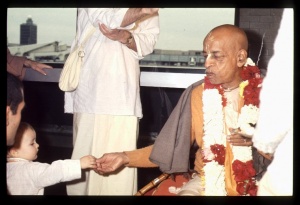SB 4.22.28

A.C. Bhaktivedanta Swami Prabhupada
TEXT 28
- ātmānam indriyārthaṁ ca
- paraṁ yad ubhayor api
- saty āśaya upādhau vai
- pumān paśyati nānyadā
SYNONYMS
ātmānam — the soul; indriya-artham — for sense gratification; ca — and; param — transcendental; yat — that; ubhayoḥ — both; api — certainly; sati — being situated; āśaye — material desires; upādhau — designation; vai — certainly; pumān — the person; paśyati — sees; na anyadā — not otherwise.
TRANSLATION
When the soul exists for sense gratification, he creates different desires, and for that reason he becomes subjected to designations. But when one is in the transcendental position, he is no longer interested in anything except fulfilling the desires of the Lord.
PURPORT
Being covered by material desires, a spirit soul is also considered to be covered by designations belonging to a particular type of body. Thus he considers himself an animal, man, demigod, bird, beast, etc. In so many ways he is influenced by false identification caused by false egotism, and being covered by illusory material desires, he distinguishes between matter and spirit. When one is devoid of such distinctions, there is no longer a difference between matter and spirit. At that time, the spirit is the only predominating factor. As long as one is covered by material desires, he thinks himself the master or the enjoyer. Thus he acts for sense gratification and becomes subjected to material pangs, happiness and distress. But when one is freed from such a concept of life, he is no longer subjected to designations, and he envisions everything as spiritual in connection with the Supreme Lord. This is explained by Śrīla Rūpa Gosvāmī in his Bhakti-rasāmṛta-sindhu (1.2.255):
- anāsaktasya viṣayān
- yathārham upayuñjataḥ
- nirbandhaḥ kṛṣṇa-sambandhe
- yuktaṁ vairāgyam ucyate
The liberated person has no attachment for anything material or for sense gratification. He understands that everything is connected with the Supreme Personality of Godhead and that everything should be engaged in the service of the Lord. Therefore he does not give up anything. There is no question of renouncing anything because the paramahaṁsa knows how to engage everything in the service of the Lord. Originally everything is spiritual; nothing is material. In the Caitanya-caritāmṛta (CC Madhya'' 8.274) also it is explained that a mahā-bhāgavata, a highly advanced devotee, has no material vision:
- sthāvara-jaṅgama dekhe, nā dekhe tāra mūrti
- sarvatra haya nija iṣṭa-deva-sphūrti
Although he sees trees, mountains, and other living entities moving here and there, he sees all as the creation of the Supreme Lord and, with reference to the context, sees only the creator and not the created. In other words, he no longer distinguishes between the created and the creator. He sees only the Supreme Personality of Godhead in everything. He sees Kṛṣṇa in everything and everything in Kṛṣṇa. This is oneness.